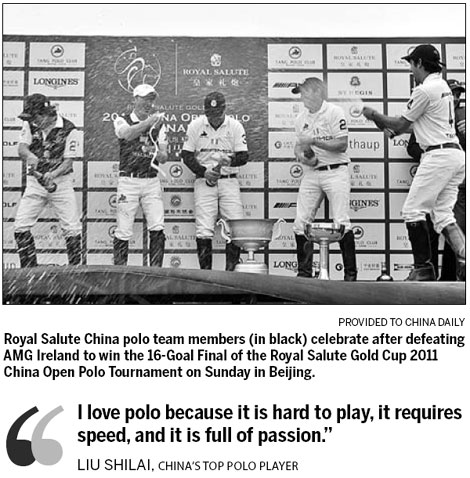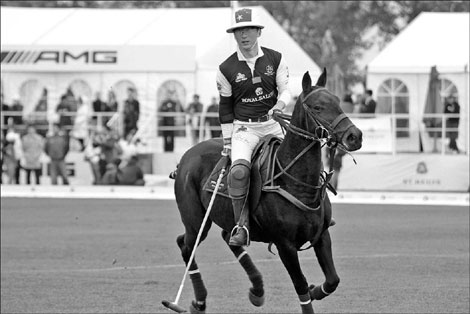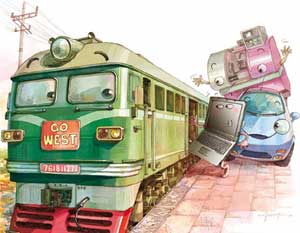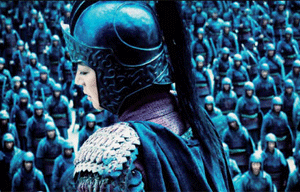A man, his horse, His mallet, his life
Updated: 2011-10-26 07:58
By Wu Ying (China Daily)
|
|||||||||
|
Six years after picking up the sport, Liu Shilai has become the top polo player in China. Liu, who founded the Tang Polo Club, credits the sport with keeping him healthy and stress-free. Provided to China Daily |
Liu Shilai is a man of many passions, but he's found happiness and success in polo, Wu Ying writes
Liu Shilai loves a great many things. Alone at the top of that list: Polo. "If I continue playing polo, I might get close to a divorce," said the businessman, sailor, water-skier, founder of the Tang Polo Club, and China's first member of the International Polo Association.
If he seems like an extraordinarily busy man, it's because he is. But his focus isn't too complicated.
"I'm just an ordinary player, couldn't be simpler," Liu said.
"It is the sport per se that fascinates me, not the social intercourse, not the so-called beau monde ambience, which mean nothing to me. I love polo because it is hard to play, it requires speed, and it is full of passion."
The 39-year-old talked to China Daily last weekend while tying his knee guards for the third chukka of a 4-goal final.
Asia's highest-level event, the inaugural Royal Salute Gold Cup 2011 China Open Polo Tournament, concluded on Sunday with Liu lifting the winner's trophy in the 16-Goal Final with his Royal Salute China polo team members.
Liu, chairman of Jing Hung Investment Co Ltd, was introduced to polo by Jordan's ambassador to China, Anmar A.H.N.Al-Hmoud, in 2005.
He was immediately hooked.

Over the past six years, Liu has trained and competed around the world. He progressed rapidly from a handicap of -2 to 1. He was the champion of US Polo Open 4 Handicap in 2008.
Professional polo players are graded from -2 to 10 goals under the handicap system.
The term "goal" does not refer to how many goals the player will score in a match but indicates the player's value to the team.
There are fewer than 10 handicap of 10 players in the world, and 50 players are above a handicap of 6. Good professional players are above a handicap of 3.
"Ninety percent of players stay at handicap -1 and never reach 0," Liu said in an earlier interview. "Higher level, fewer players."
Liu said he would eventually like to reach a handicap of 3 or 4.
"I will try to reach 3 next year," said Liu, who has signed up for the three top tournaments in Argentina. He will fly to Thailand for the Asian Cup next spring, then Egypt and Ghana, then back to Argentina. He will fly home next May when the season begins.
"Not like golf, for instance, polo emphasizes the connection between the player and the horse. The horse becomes my legs' extension, the mallet elongates my arm, and thus the horse, the mallet and I become one," Liu said. "It is also a team effort like a soccer match, in which you need to wait for your team member to run to the right position, and then you feed the ball to him. If (Formula One driver) Michael Schumacher solves 10 problems in one second, a polo player deals with at least eight to 10, too."
Liu believes polo keeps him healthy in both body and mind, and keeps his stress down.
"More people nowadays suffer an unhealthy mindset," he said. "If I continue playing polo, I will never get depressed my whole life."
Polo's traditions also attract him.
"Every weekend, each player brings the whole family to the polo field," he said.
"All the kids help the fathers curry (groom) the horses, clean the stable, enjoy the matches, and tread the divot It is like a family day. The kids grow together, and when the fathers hang up the mallet, they can watch their children play. Just like that, (the polo tradition) passes down from generation to generation."
Liu has a 2-year-old son he hopes will inherit the love for the game, but he says he won't force the issue.
"If he gets really into it, you cannot stop him anyway," Liu said.
Liu shrugged off any claim as polo's standard-bearer in China, where the sport originated 2,000 years ago in the East Han Dynasty and peaked in the Tang Dynasty.
"I am not that great. I just think that it is a good thing that many hands make light work," he said.

(China Daily 10/26/2011 page23)












